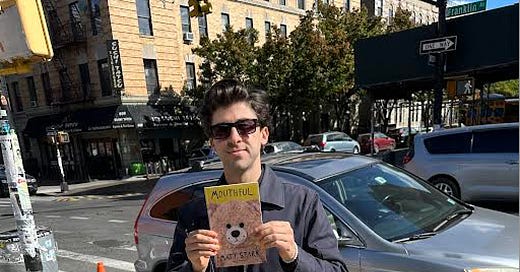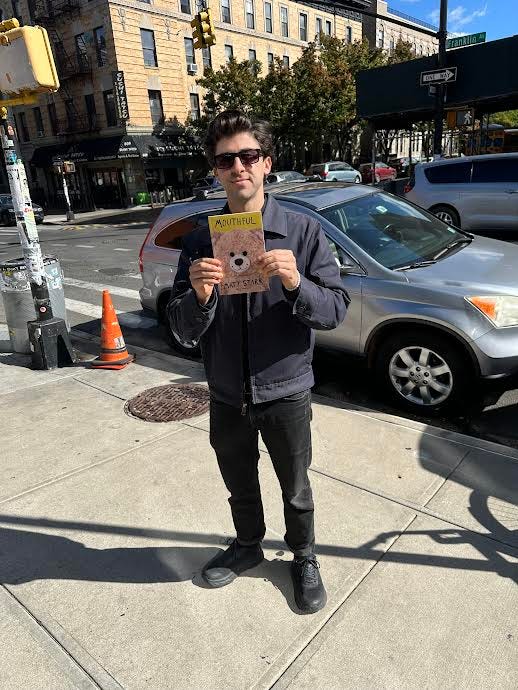I Heart Matt Starr's New York
Coffee with the poet, publisher, promoter and Paddington Bear super fan
It’s easy to think New York City has run out of romantic weirdos who live to create. You look around and see chain stores and read about the wildly high rents, and you have to wonder what artists could actually afford to live anywhere in the five boroughs at this point. That James Murphy line about “the boring collect” rings in my ears whenever I walk through Manhattan and I see places where I used to go see bands play or I used to spend hours drinking and laughing with old friends have been replaced by a pickleball equipment store or some other private equity cash grab, and I wonder if the naysayers are right this time and the place is dead.
The answer is that it’s not, and likely never will be. I can’t tell you why that is, but I know part of the reason is there will always be people like Matt Starr. Since I got to know him a few years ago, I tell anybody who will listen that I really like Matt's version of New York City. It’s weird and romantic, enamored with the past but modern at the same time, and devoid of cynicism. A perfect example is when he brings up one of the biggest influences on his poetry. It’s a name I haven’t heard anybody in literary circles bring up in…I don’t know how long. I don’t know who is reading Charles Bukowski these days, or if there’s some sort of embarrassment to admit you do, but he’s part of Matt’s story that the younger poet won’t dare omit.
“I felt shame about it for a while because people hate on him so much, but then I read him and it gave me permission to be beautiful and disgusting,” he tells me over coffee.
Starr grew up in suburban New Jersey. His parents were supportive, his high school had a diverse group of students, and people in Maplewood were generally nice to each other. “I just felt like I couldn’t find my place there, and I kept trying new things. I was unapologetic in my interests. I was the only white Jewish kid in the gospel choir, and I loved it. Then I heard about Scratch Academy in New York and I decided I wanted to learn that. Now everybody is a DJ, but this was 2005, and my dad would take me into the city every weekend, but nothing except the gospel choir clicked. I was constantly longing for connection and always looking for a group of boys to hang out with, but could never find it.”
There’s nothing disciplined about what Matt does or how he creates, and that’s part of his allure. His poetry is as playful as it is dirty and sometimes dark, and his first collection, Mouthful, was published on Dream Baby, the indie press he co-founded with his friend Zack Roif. At some point in our conversation, Matt off-the-cuff admits “I don’t get how any of this publishing stuff works,” and I thought about how I’ve heard plenty of writers, editors, and people who actually work in the traditional publishing world have said the same thing. The difference is that Matt and Zach don’t seem daunted by that, and they’re going to put out the books they want regardless of what anybody says.
With Dream Baby, his poetry, and the events he puts on, there’s a lineage that goes back decades; it picked up in the 1960s with artists like The Fugs and Velvet Underground, then stretched into the 1970s and ‘80s when you could go out and probably catch Eileen Myles or Kathy Acker reading somewhere in the Village, or catch Jim Jarmusch or Richard Kern on the street making a no-budget film. Maybe I’m romanticizing those eras a little, but I know things happened because I’ve read the poetry, listened to the albums, and seen the movies. The energy was undeniable, and the only reason I can come up with is because people just did things. They didn’t do it because they saw somebody else do it on TikTok or they were hoping to strike it rich—they just had to make stuff. Matt is that way.
“I started writing poetry in 2016, but it was kind of a joke to me at that time. I was also doing film, and we did the Annie Hall thing.”
The thing was a remake of the 1977 film using all senior citizens that Matt made with Ellie Sachs in 2018. That was the first time I really started paying attention to what he was doing. Anthony Bourdain’s production film company caught wind of the project and wanted to take the concept of remaking classic films with older folks and turn it into a series. The idea died when the pandemic hit, and Matt needed direction. “I had a friend just tell me, do something for yourself; write some poems and come perform on my roof.” The friend told Matt to write seven; he wrote 30. “I was like Oh my God, this was dormant. I had all these ideas for films that also felt like they were ideas for poems.”
Matt’s background was originally film and art. He’d gone to college in Bloomington, where he says he learned about French New Wave films and the New York punk and art scenes of the 1970s and early-1980s. “I discovered what DIY really meant in Bloomington,” he says.
I hadn’t known that little bit about Matt living in Indiana prior to our coffee, but it made sense to me. Bloomington is a great town, and there is something about getting obsessed with New York City culture when you’re sitting in the Midwest that just hits differently. I say this from personal experience: it’s probably why I read Bright Lights, Big City so many times, and watched Basquiat at least five times the year it was released. I gobbled up zines that had reviews of Lower East Side hardcore shows and wore out a dubbed cassette of The Velvet Underground & Nico that I listened to while I went for long walks in the lonely suburb where I went to high school. I knew New York City, but I had an idea of what living there and trying to make art looked like that I didn’t get to experience until I moved here and tried making it as a writer in my early-20s. I think in those early days, I was expecting something a little like the places and eras I’d read about and had been attracted to—Cedar Tavern in the 1950s, Greenwich Village in the 1960s, the Lower East Side and Soho of the 1980s, etc.—especially because Williamsburg had only recently become shorthand for “where the artists live,” as well as dressed terms like “gentrification” and “hipster.” It’s too easy to fall into the trap of either being cynical or overly nostalgic about those times because I was younger and had more hair, but I do miss walking into a video store and seeing the guy from a hardcore band I liked suggesting William Friedkin’s Sorcerer or some artist who did these incredible dayglo psychedelic paintings of geometric patterns was working behind the bar. But I don’t think I appreciated it enough back then, and that makes me appreciate Matt and what he does even more.
Given that he’s only been “serious” about writing poetry for four years now, Matt has been pretty successful between the book this year and getting a poem published by The New Yorker in 2022. I really enjoy his poetry. It’s bare but not hollow, and it’s honest in a way that could probably make more than a few people uncomfortable (his mother has said she isn’t a fan of his work). Some poetry is fine to read when you’re sitting by yourself, but Matt’s is best when he’s reading it to a roomful of people. And it’s even better when it’s an event Matt and Zach put on. In an age of everybody trying to “go viral” with videos we’ll likely laugh at and stop caring about in a few days, the Dream Baby events you have to physically go to and experience end up becoming news stories on their own. They’re held in porn shops and the Sbarro Pizza across from Penn Station, and not bars or bookstores. They’re raucous and fun, and everybody looks cool as hell. I can’t help but think back to 20-or-so years ago when something you’d overhear in a Williamsburg coffee shop was “I’m going to some Todd P show tonight. It’s some Balkan-influenced hardcore band that has a psychedelic light show, somebody from TV on the Radio is DJing, and it’s in a churro factory.” but also the scene in Martin Scorsese’s contribution to 1989’s New York Stories where Steve Buscemi’s character is delivering a spoken word piece in a subway tunnel. Matt and Zach aren’t trying to be cute or host readings in off-beat places to get attention. “Isn't it more interesting to hear something weird and interesting in a weird and interesting place? We live in New York City, why not take advantage of it?”
Editor’s note: I’d started planning to write something about Matt and the stuff he does two years ago, but it didn’t end up happening. At some point between then and me getting around to finishing this, he ended up working for Substack as the Events and Writer Relations person. I figured I’d be transparent about that in case you notice his name connected to this platform. I swear they didn’t promise me bags of money or anything like that. I really like and appreciate Matt!





Bags of money would have been nice tho.
Shit didn’t know he lived in Bloomington